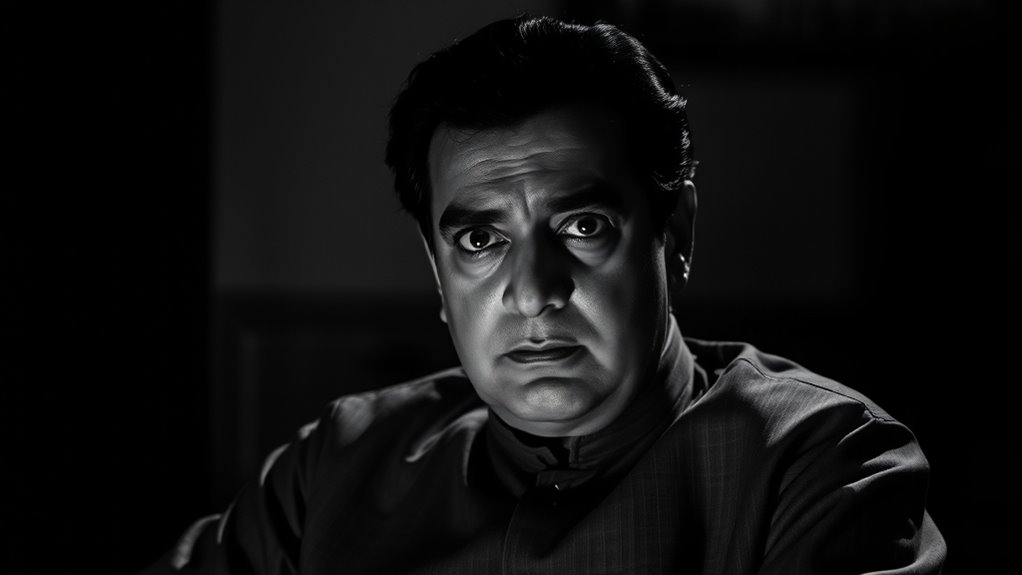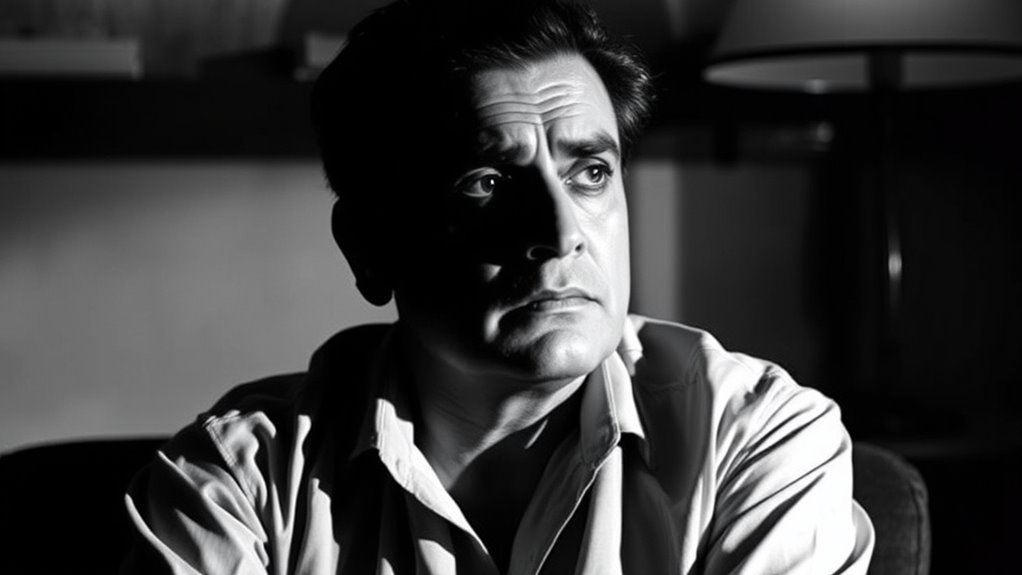Dilip Kumar is called the “Tragedy King” because of his exceptional ability to portray complex, emotionally intense roles that resonate deeply with his audience. His acting style, marked by restraint and subtlety, brings authenticity and vulnerability to every character. He masterfully navigates a wide range of human emotions, making his performances memorable and timeless. If you explore further, you’ll discover how his unique approach set him apart and cemented his legendary status.
Key Takeaways
- He masterfully portrayed complex, tragic characters with subtlety and emotional depth, making his roles profoundly impactful.
- His restrained acting style emphasized nuance and authenticity, distinguishing his performances from exaggerated expressions.
- Dilip Kumar’s ability to convincingly depict human pain, betrayal, and inner turmoil earned him the nickname “Tragedy King.”
- His legacy is built on creating unforgettable, emotionally authentic characters that resonate deeply with audiences.
- His performances elevate tragic roles beyond entertainment, inspiring generations with his mastery of human emotions.

Have you ever wondered what makes an actor truly unforgettable? It’s not just about the lines they deliver or the scenes they shine in; it’s about the depth they bring to their characters. When you watch Dilip Kumar perform, you realize how his acting style distinguishes him from others. His ability to portray complex emotions with subtlety and authenticity set him apart, making every role he played resonate deeply with audiences. That emotional depth is what earned him the nickname “Tragedy King,” because he could make you feel every tear, every heartbreak, and every moment of despair as if it were your own.
Dilip Kumar’s emotional depth and subtlety define his unforgettable, authentic performances as the true tragedy king.
Dilip Kumar’s acting style was marked by restraint and nuance. Unlike many actors who relied on exaggerated gestures or dramatic expressions, he chose to embody his characters with a quiet intensity that drew viewers in. His performances often involved minimal movement but maximum emotional impact, allowing audiences to connect with the inner turmoil of his characters. This approach made his portrayals of tragic figures so compelling that you couldn’t help but be moved by his authenticity. His mastery lay in his ability to balance vulnerability with strength, creating characters that felt real, raw, and relatable.
When you watch his films, you notice how he navigates the spectrum of human emotion with ease. His emotional depth wasn’t just a product of acting skills; it was a reflection of his sensitivity and understanding of human nature. He could make you believe in the pain of a lost love, the agony of betrayal, or the despair of a man torn between duty and desire. This capacity to evoke genuine feelings is why his performances continue to stand the test of time. Moreover, his acting style exemplifies how subtlety can effectively convey profound tragedy, inspiring generations of actors to explore nuanced performances.
Dilip Kumar’s reputation as the “Tragedy King” isn’t just about the roles he played but about how he played them. His acting style combined with his emotional depth created unforgettable characters that linger in your mind long after the credits roll. His ability to make you empathize with his characters elevated him to a status where his performances became a masterclass in conveying tragedy with grace and authenticity. To watch him is to witness the power of true acting—where every gesture, every look, and every silence speaks volumes about the human condition. That’s why Dilip Kumar remains an enduring icon, the quintessential tragedy king whose legacy endures through the emotional truths he brought to life on screen.
Frequently Asked Questions
What Are Dilip Kumar’S Most Iconic Tragic Roles?
When you explore Dilip Kumar’s most iconic tragic roles, you see his mastery in portraying romantic tragedies with emotional depth. Films like “Devdas” showcase his ability to evoke deep sorrow and longing, while “Madhumati” reveals his talent for blending romance with tragedy. His performances draw you into his characters’ inner struggles, making these roles unforgettable. Kumar’s portrayal of tragedy and romance sets a standard in Indian cinema, earning him lasting admiration.
How Did Dilip Kumar Influence Indian Cinema?
You might not realize it, but Dilip Kumar revolutionized Indian cinema by introducing method acting and emotional depth, transforming performances into powerful storytelling tools. His dedication to realism and nuanced portrayals set new standards, inspiring generations of actors. He elevated the art form, making cinema more expressive and authentic. His influence is like a silent force, shaping the industry’s evolution and proving that true artistry lies in raw, heartfelt performances.
What Awards Did Dilip Kumar Receive for His Performances?
You’ll find that Dilip Kumar received numerous awards recognition for his performances, including eight Filmfare Awards and the Dadasaheb Phalke Award. His work earned critical acclaim, establishing him as a legendary actor in Indian cinema. His dedication and powerful portrayals garnered respect and admiration, making him one of the most decorated actors of his time. These accolades highlight his immense contribution and enduring influence on the film industry.
How Did Dilip Kumar’s Personal Life Impact His Career?
You might not realize it, but Dilip Kumar’s personal struggles deeply influenced his career. His emotional resilience helped him navigate heartbreaks and health issues, shaping his powerful performances. These hardships fueled his ability to portray intense, tragic roles convincingly, earning him the nickname “Tragedy King.” His personal life’s challenges didn’t hinder him; instead, they strengthened his dedication, making his acting more authentic and memorable for audiences worldwide.
Why Is Dilip Kumar Considered a Pioneer in Method Acting?
You see, Dilip Kumar is considered a pioneer in method acting because he mastered emotional depth and realistic portrayals. He deeply immerses himself in his roles, bringing authentic feelings to the screen. By using technique and introspection, you can see how he transforms his performances, making characters genuinely resonate. His approach set new standards in Indian cinema, inspiring actors to adopt method acting and deliver more compelling, emotionally charged performances.
Conclusion
Imagine walking through a stormy night, each gust echoing the pain and depth of Dilip Kumar’s performances. His portrayal of tragedy isn’t just acting; it’s like living in a rain-soaked world where every tear tells a story. That’s why he’s called the “Tragedy King”—because he made you feel every heartbreak as if it was your own. His artistry turned cinema into a mirror reflecting life’s darkest, most beautiful moments, forever etching his name in history.








